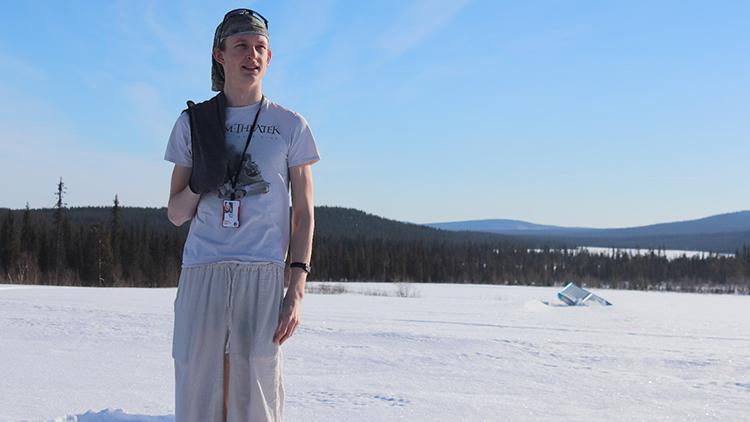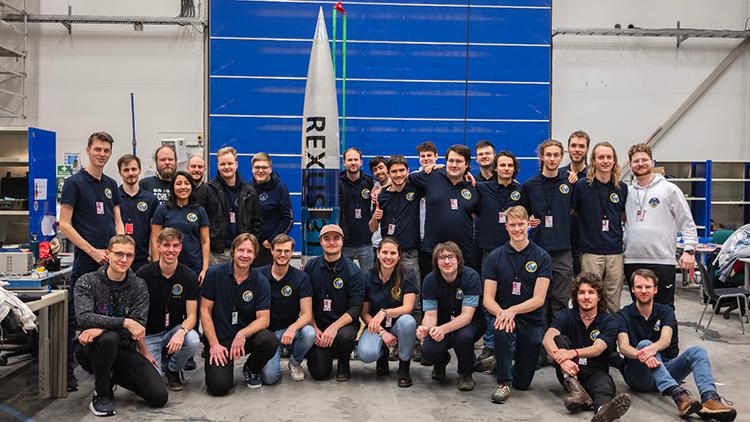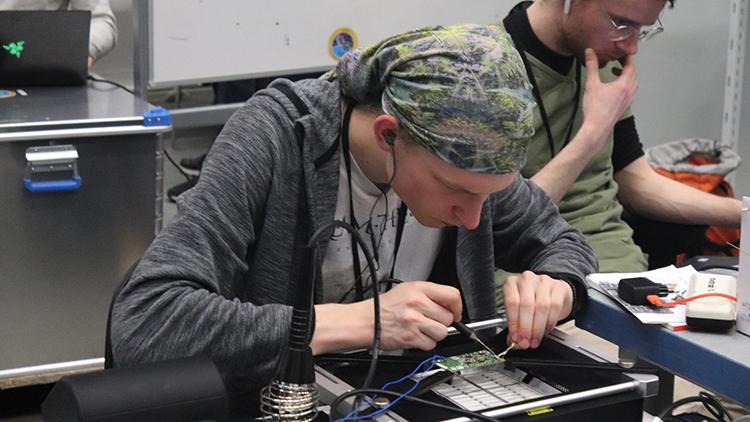He's joined a research team that studied rocket missions
UU student Daan is Captain Jack Sparrow in Sweden

Daan is pursuing a Master's in Earth, Surface & Water at the Faculty of Geosciences. Last summer, he completed no fewer than three Bachelor's degrees: Physics & Astronomy, Mathematics and Earth Sciences. All at UU. Before that, he studied Physics & Astronomy at Radboud University Nijmegen for a year.
Six years ago, at the latter university, he encountered the PR⁴ Space project. “It is a student team that conducts experiments with rockets. There are eight other students, who come from Radboud University and TU Eindhoven, among other institutions. I am the only student from UU and the project's team leader.”
“The goal of our tests is to improve space travel. We devise a research plan and then carry out tests above the Arctic Circle, in Kiruna, Sweden. It is a very remote place, ideal for shooting rockets into the air. This is my second time here.”
How did you become interested in this project?
“Now that our world has already been pretty much explored, space travel is a modern way to be an explorer. I would love to do this professionally in the future."
Does one necessarily have to possess a background in Physics to participate in PR4Space?
"No. Non-physicists are important too, although a STEM background is useful. We must learn many things ourselves, such as maintaining administration, finances and social media. We also keep in touch with organisations like the European Space Agency (ESA). We even designed a logo for our website ourselves.”
What kind of experiments does your team conduct?
“One of the two experiments we conduct is called Rexus/Bexus and is being carried out with the help of the Swedish (SNSA) and German (DLR) space organisations, as well as ESA. Our goal is to create a satellite navigation system that is cheaper and more accurate. Currently, navigation only keeps track of where the rocket is every second. By sticking antennas on the rocket, we hope to be able to track it every millisecond. A network of antennas on the ground will then always determine the exact location.”
Why are so few UU students involved in the project?
“I think it's a shame that I am the only one from UU. But student research teams like this one are more common at technical universities, so UU students only hear about PR4Space through word of mouth.”

What kind of problems does your team encounter?
“The project works with volunteers. That makes it hard to find new members. Students often want to get credits or financial compensation for their contributions. We have been putting in at least 40 hours a week for a year, which can go up to 100 hours a week right before deadlines and during tests. Furthermore, while conducting research, sometimes hardware is not ready yet or needs to be recreated, which throws a spanner in the works. Since the equipment is fragile, we cannot conduct any tests when it snows.”
What are your main activities?
“I make the software, electronics and measuring instruments for the tests. For example, I write algorithms for better accuracy and solder parts for printed circuit boards (PCBs) of transmitters. I sometimes solder until 2:00 am to finish a part on time. Since the chip's pins must always be connected to the correct parts, our team calls this 'PCB surgery.' In this case, I'll only have had 1.5 hours of sleep and still sit with a magnifying glass in front of my nose.”
You've been given a funny nickname, can you tell us more about that?
“ESA nicknamed me 'Captain Jack Sparrow' during a launch. The supervisor said: 'He's nuts, but he gets them out of every situation.'” Only then did they find out that my last name in Dutch is Kapitein, which means 'Captain'. So, funny enough, the nickname 'Sparrow' stuck.”

How do you look back on your adventure so far?
“Through the project, I have expanded my leadership skills and learned to deal with stress better. We have secretly become pretty good at solving problems while being in a remote place and under quite a bit of pressure. I also got to know a lot of organisations and people who work there, which could prove useful later.
Not everything went super well, though. We had to sacrifice some ideas, but I am proud that we will soon have scientific publications to our name and be able to speak at conferences. UU professors will be there too, so meeting them will make it even nicer."